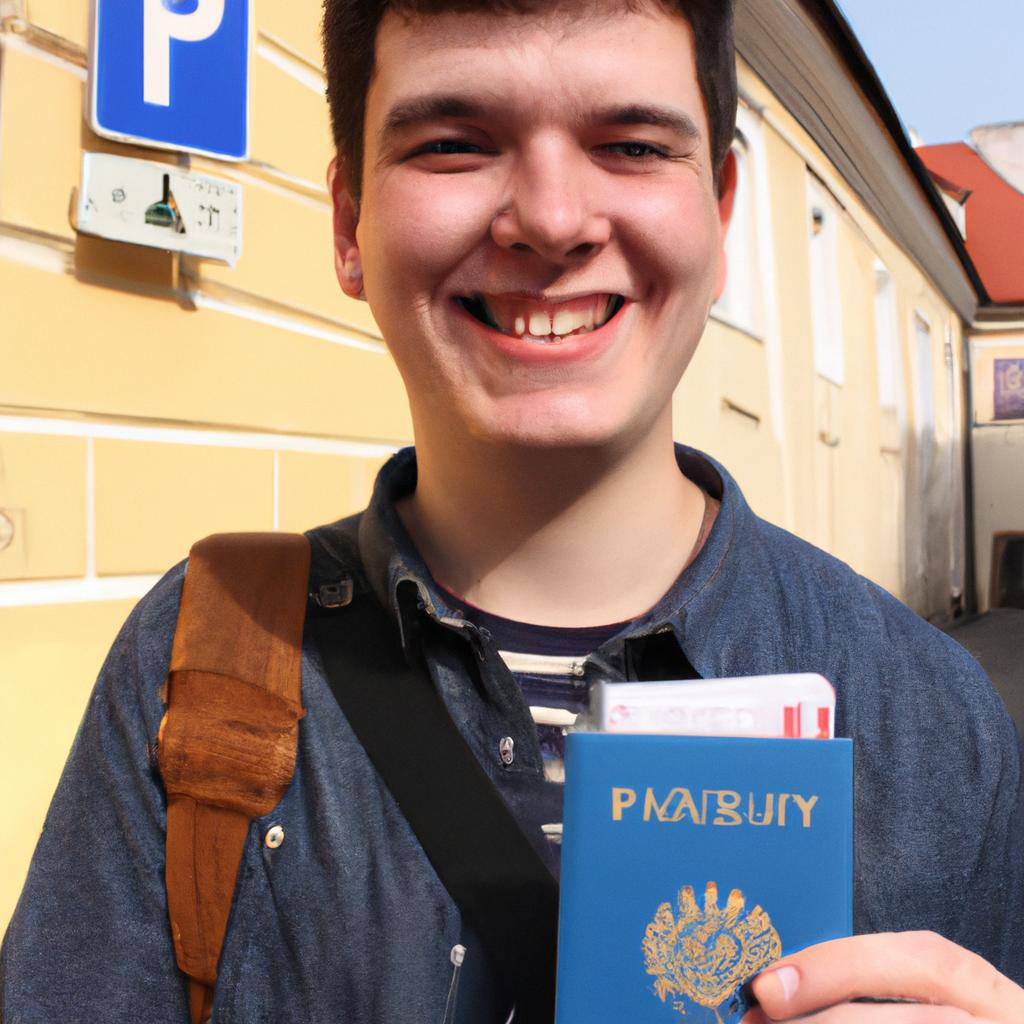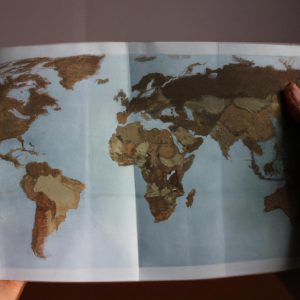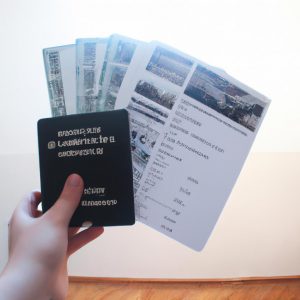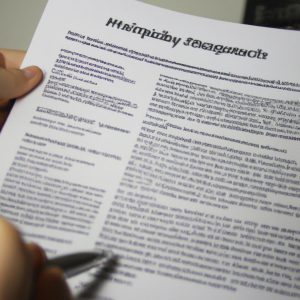Travel Finance: A Guide to Managing Your Finances While With Travel Directory

Traveling can be an exciting and enriching experience, allowing individuals to explore new cultures, indulge in adventure, and create lasting memories. However, amidst the thrill of travel, it is crucial not to overlook the importance of managing finances effectively. This article aims to provide a comprehensive guide on how to navigate the realm of travel finance while utilizing Travel Directory as a valuable resource.
Consider the case of Sarah, a passionate traveler who embarked on a month-long journey across Europe. With her limited budget and desire for exploration, she found herself facing various financial challenges along the way. From navigating fluctuating exchange rates to unexpected expenses such as accommodation and transportation costs, Sarah soon realized that without proper financial planning, her dream trip could quickly turn into a nightmare. Therefore, understanding how to manage finances efficiently during travel becomes paramount in ensuring a smooth and stress-free journey.
In this article, we will delve into key aspects of travel finance management, including creating a realistic budget, utilizing technology tools for expense tracking, exploring cost-saving strategies through Travel Directory’s offerings, and addressing common pitfalls that travelers often encounter. By following these guidelines and harnessing the resources available through Travel Directory, individuals can embark on their adventures with confidence knowing they have taken proactive steps towards maintaining control over their finances and maximizing their travel experience.
The first step in effective travel finance management is creating a realistic budget. Before embarking on a trip, it is essential to assess your financial situation and determine how much you can comfortably spend on your travels. Consider expenses such as accommodation, transportation, meals, activities, and miscellaneous costs. Research the average prices of these items at your destination using Travel Directory to get an idea of what to expect.
Once you have established a budget, it’s important to track your expenses throughout your journey. This can be done easily with the help of technology tools such as expense tracking apps or spreadsheet templates. By diligently recording every expenditure, you can keep tabs on your spending and identify areas where you may need to cut back or adjust accordingly. Travel Directory can provide recommendations for useful expense tracking apps that fellow travelers have found helpful.
One valuable resource available through Travel Directory is its extensive listing of cost-saving strategies. From discounted accommodations and flights to deals on local attractions and activities, Travel Directory offers a wealth of options for travelers looking to make their money stretch further. By taking advantage of these offerings, you can enjoy incredible experiences without compromising your budget.
While exploring new destinations, it’s important to be mindful of common financial pitfalls that travelers often encounter. Beware of currency exchange scams and always research reputable places to exchange money or use reliable methods such as withdrawing from ATMs with low transaction fees. Additionally, be cautious when using credit cards abroad as some establishments may charge high foreign transaction fees. It’s also wise to notify your bank about your travel plans beforehand to avoid any issues with card usage.
In conclusion, by following these guidelines for travel finance management and utilizing the resources available through Travel Directory, individuals can ensure they have a well-planned and financially responsible journey. Remember to create a realistic budget, track expenses diligently using technology tools recommended by Travel Directory, take advantage of cost-saving strategies offered by the platform, and stay vigilant against common financial pitfalls. With these measures in place, you can embark on your travels with peace of mind, knowing that you have taken proactive steps towards managing your finances effectively and maximizing your travel experience.
Understanding Your Financial Situation
Imagine you are planning a dream vacation to a tropical island. You have always wanted to experience the sun, sand, and clear blue waters that this destination offers. However, before embarking on your journey, it is essential to understand your financial situation. By taking the time to assess your finances, you can ensure that you make informed decisions and avoid any unnecessary financial stress during your travels.
To begin, let’s consider some key factors that contribute to understanding your financial situation:
- Income: Evaluate your current income sources and determine how much money you have available for travel expenses. This includes considering both regular income streams as well as any additional funds from savings or investments.
- Expenses: Analyze your monthly expenses and identify areas where you can cut back or save money in order to allocate more towards your travel budget.
- Debt: Take into account any outstanding debts or loans that may affect your ability to finance your trip comfortably. It is crucial to prioritize paying off high-interest debt before allocating funds towards non-essential expenditures.
- Savings: Assess the amount of savings you currently have set aside for emergencies or unexpected expenses. Consider if dipping into these savings would be necessary or advisable for financing your travel plans.
In addition to these considerations, visualize the following table illustrating how different levels of disposable income might influence one’s ability to fund their ideal vacation:
| Level of Disposable Income | Ability to Fund Vacation |
|---|---|
| High | Able to cover all costs |
| Moderate | May need to make adjustments or compromises in itinerary |
| Low | Difficulties funding entire trip; may require additional saving or alternative options |
By evaluating these aspects of your financial situation, you will gain a comprehensive understanding of what resources are available for funding your travel adventure. In doing so, you can proceed with greater confidence and peace of mind knowing that you have made informed choices regarding your travel finances.
Transitioning into the subsequent section about “Creating a Travel Budget,” it is important to now delve deeper into how you can effectively allocate your resources towards specific expenses while on your journey.
Creating a Travel Budget
Imagine this scenario: Sarah, a passionate traveler, has embarked on a month-long journey across Europe. She meticulously planned her itinerary and created a travel budget to ensure she stays within her financial means. However, as she navigates through different countries, currencies, and expenses, managing her finances becomes increasingly challenging. In this section, we will explore practical strategies for effectively managing your finances while traveling.
To begin with, staying organized is crucial when it comes to tracking your expenditures. By keeping receipts and documenting every transaction in a dedicated notebook or smartphone app, you can easily monitor your spending patterns and identify areas where adjustments may be needed. This not only helps maintain an accurate record of your expenses but also provides valuable insights into how well you are adhering to your budget.
Additionally, consider following these key tips to maximize your financial management efforts:
- Set aside an emergency fund: Unexpected situations such as lost belongings or medical emergencies can adversely impact your travel plans and budgets. Having a separate emergency fund specifically allocated for unforeseen circumstances grants peace of mind during travels.
- Research local banking options: Transacting abroad can often lead to hefty currency exchange fees and unfavorable conversion rates. Prioritize researching and selecting banks that offer favorable foreign exchange rates or partnering with institutions that have international partnerships.
- Utilize technology wisely: Travel-friendly apps designed for expense management can help streamline the process of logging expenditure details. Additionally, mobile banking applications allow easy access to account information and transactions from anywhere in the world.
- Stay informed about bank policies: It is essential to notify your bank before embarking on international travel to avoid potential card blocks due to suspicious activity flags triggered by out-of-country transactions.
To further illustrate the significance of effective finance management while traveling, let us examine a comparison between two hypothetical scenarios:
| Scenario | Financial organization | Stress level |
|---|---|---|
| Scenario A | Maintains meticulous financial records, utilizes expense management apps, and keeps track of currency exchange rates. | Low |
| Scenario B | Lacks organization, fails to monitor expenses, and overlooks unfavorable conversion rates. | High |
As you can see from the table above, maintaining financial organization significantly reduces stress levels during your travel experience.
In conclusion to this section on managing your finances while traveling, it is crucial to remember that disciplined financial habits contribute not only to a worry-free journey but also provide a solid foundation for future trips. By staying organized and informed about banking options and utilizing technology wisely, you can navigate through foreign lands with confidence.
Tracking and Monitoring Your Expenditures
Transitioning from the previous section on creating a travel budget, it is essential to track and monitor your expenditures while traveling. This will help you stay within your budget and ensure that you have enough funds for the entirety of your trip. Let’s explore some effective strategies for tracking and monitoring your expenses.
One practical way to keep track of your spending is by using a mobile app designed specifically for this purpose. For instance, let’s consider the case of Sarah, who is planning a two-week vacation in Europe. She downloads a popular expense-tracking app onto her smartphone before embarking on her journey. Using the app, Sarah records each expenditure she makes during her trip, categorizing them into different expense types such as accommodation, transportation, meals, and leisure activities.
To further assist you in managing your finances while traveling, here are some key tips:
- Set a daily or weekly spending limit to avoid overspending.
- Keep all receipts and invoices as proof of purchase.
- Regularly review and analyze your spending patterns to identify areas where you can cut back without compromising the quality of your trip.
- Be mindful of any additional fees associated with international transactions or currency conversions.
Now let’s take a look at an example table illustrating how Sarah successfully tracked and monitored her expenses during her European vacation:
| Expense Category | Amount Spent (in USD) | Percentage of Total Budget |
|---|---|---|
| Accommodation | $800 | 25% |
| Transportation | $500 | 16% |
| Meals | $600 | 19% |
| Leisure Activities | $900 | 28% |
As shown in the table above, Sarah allocated approximately 25% of her total budget towards accommodation costs. By regularly referring to such data throughout her trip, she was able to make informed decisions about her spending habits and adjust accordingly.
In summary, tracking and monitoring your expenditures while traveling is crucial for maintaining financial control. By utilizing expense-tracking apps, setting spending limits, and analyzing your spending patterns, you can ensure that you stay within your budget and make the most of your travel experience.
Managing Currency Conversion
Transitioning from the previous section on tracking and monitoring expenditures, it is crucial to address another key aspect of managing travel finances – currency conversion. When traveling abroad, dealing with different currencies can be both challenging and confusing. However, by understanding how to effectively manage currency conversion, travelers can minimize costs and make informed financial decisions.
To illustrate this point, consider a hypothetical scenario where Sarah plans a trip to Europe. She needs to convert her home currency (USD) into Euros for her expenses during the trip. Without proper planning and knowledge about exchange rates, Sarah may end up losing a significant amount of money due to unfavorable conversions.
To navigate the complexities of Currency Conversion while traveling, keep in mind the following tips:
- Research Exchange Rates: Before leaving for your destination, research current exchange rates so you have an idea of what to expect when converting your money.
- Choose Reliable Exchange Options: Look for reputable places that offer fair exchange rates and low fees such as banks or licensed foreign exchange bureaus.
- Consider Alternatives: In addition to traditional methods like exchanging cash at banks or using credit cards, explore digital payment options or prepaid travel cards that offer competitive rates.
- Be Mindful of Dynamic Currency Conversion (DCC): When making purchases abroad using a credit card, some establishments may offer DCC which allows transactions in your home currency. While convenient, these transactions often come with high fees and less favorable exchange rates compared to local currencies.
By adopting these strategies and being proactive in managing currency conversion while traveling, individuals can save money and ensure their finances are optimized throughout their journeys.
Understanding the importance of comprehensive coverage helps safeguard against unforeseen events that could disrupt even the most well-planned trips.
Exploring Insurance Options
When traveling abroad, managing currency conversion is essential to ensure that you make the most of your financial resources. By understanding the intricacies of currency exchange rates and utilizing effective strategies, you can minimize costs and maximize your purchasing power while exploring new destinations.
For example, let’s consider a traveler named Sarah who is planning a trip to Europe. Before her departure, Sarah researches the current exchange rates for Euros and finds that 1 US Dollar (USD) equals 0.85 Euros (EUR). With this information in mind, she decides to convert $500 USD into Euros at her local bank before leaving. This way, she avoids unfavorable commission fees or higher exchange rates typically found at airports or tourist areas.
To effectively manage currency conversion during your travels, consider the following tips:
- Research: Stay updated on current exchange rates by using reliable sources such as financial websites or mobile applications.
- Timing: Monitor fluctuations in exchange rates and aim to convert larger sums of money when rates are favorable.
- Payment options: Compare different payment methods such as cash, credit cards, or prepaid travel cards to determine which option offers the best value for each situation.
- Local ATMs: Instead of carrying large amounts of cash with you, use local ATMs for smaller withdrawals. However, be cautious about transaction fees charged by both your home bank and the foreign ATM provider.
| Strategy | Advantages | Disadvantages | Emotional Response |
|---|---|---|---|
| Research | Informed decisions | Time-consuming | Confidence |
| Timing | Maximizes value | Requires monitoring | Excitement |
| Payment options | Convenience | Potential fees | Ease |
| Local ATMs | Security | Transaction fees | Peace of Mind |
By implementing these strategies and considering the emotional responses associated with each, you can make informed decisions when managing currency conversion while traveling. This will help ensure that your financial resources are utilized effectively, allowing you to fully immerse yourself in new experiences without unnecessary financial worries.
Transitioning into the subsequent section on “Building a Savings Plan,” it is important to not only manage your finances during travel but also before embarking on any trips. Building a savings plan provides a solid foundation for fulfilling your travel goals and aspirations.
Building a Savings Plan
Transitioning from the previous section on exploring insurance options, it is now important to shift our focus towards building a savings plan for your travel finance. By implementing an effective savings strategy, you can ensure that you have sufficient funds to cover your expenses and enjoy a worry-free journey. Let us consider the following example:
Imagine you are planning a trip to Europe. You have estimated that you will need $5,000 for airfare, accommodation, food, transportation, and other miscellaneous expenses during your two-week adventure. To achieve this goal within one year’s time frame, let’s look at some key steps in building a successful savings plan.
Firstly, evaluate your current financial situation and determine how much you can realistically save each month. This will depend on factors such as your income, monthly expenses, and any existing debt obligations. It may be helpful to create a budget that outlines both your fixed costs (rent/mortgage payments) and variable expenses (entertainment or dining out). By identifying areas where you can cut back on unnecessary spending, you can allocate more money towards your travel fund.
Secondly, establish an automatic savings system by setting up a separate bank account specifically dedicated to saving for your trip. Arrange for a portion of your paycheck to be automatically transferred into this account every month. This “out of sight” approach helps prevent temptation and ensures consistent contributions towards reaching your financial goal.
Thirdly, consider additional ways to boost your travel fund. Explore alternative sources of income like freelancing or part-time work if feasible with your schedule. Additionally, explore opportunities to reduce costs through discounts or rewards programs offered by airlines or hotels.
To further emphasize the importance of saving diligently for travel expenses while also evoking an emotional response from readers who may share similar aspirations but struggle with finances themselves:
Here are four reasons why having strong savings prior to traveling is crucial:
- Peace of mind: Having enough money saved allows you to fully enjoy your trip without constantly worrying about unexpected expenses.
- Flexibility: Having a solid savings plan provides the flexibility to explore and indulge in activities or experiences that may not have been initially planned for, enhancing the overall travel experience.
- Emergency situations: Unforeseen circumstances such as medical emergencies or sudden changes in itinerary can be financially draining. A well-established savings plan acts as a safety net during such times.
- Post-travel stability: Returning from an exciting adventure can sometimes lead to post-travel blues. By having saved enough money beforehand, you can transition back into everyday life with more ease and financial stability.
Consider the following table that illustrates how saving different amounts per month impacts the time required to reach $5,000:
| Monthly Saving | Time Required (in months) |
|---|---|
| $250 | 20 |
| $500 | 10 |
| $750 | 6.7 |
| $1,000 | 5 |
Therefore, by saving at least $500 every month, you could reach your goal of $5,000 within just ten months.
Transitioning seamlessly towards evaluating travel loan alternatives, it is essential to consider other viable options before committing to borrowing funds for your travels.
Evaluating Travel Loan Alternatives
Section 3: Evaluating Travel Loan Alternatives
Imagine you have been diligently saving for your dream vacation, but unfortunately, the amount falls short of what you need. In such situations, exploring travel loan alternatives can provide a viable solution. Let’s consider an example to understand how evaluating these options can help.
Let’s say Sarah plans to visit her family abroad and needs additional funds to cover her travel expenses. She decides to explore various travel loan alternatives before making a decision.
When considering different travel loan options, keep in mind the following factors:
- Interest Rates: Compare interest rates offered by different lenders or financial institutions. Look for loans with competitive rates that fit within your budget.
- Repayment Terms: Evaluate the repayment terms associated with each loan option. Determine whether it aligns with your financial capabilities and offers flexibility if needed.
- Fees and Charges: Consider any additional fees or charges imposed by lenders, such as processing fees or late payment penalties. These costs can significantly impact the overall affordability of the loan.
- Eligibility Criteria: Understand the eligibility requirements set forth by lenders before applying for a travel loan. This will save you time and ensure you meet all necessary criteria.
To further illustrate these considerations, let’s take a look at the table below comparing two common travel loan options:
| Loan Option | Interest Rate | Repayment Term | Additional Fees |
|---|---|---|---|
| Bank A | 8% | 24 months | $150 application fee |
| Lender B | 10% | 36 months | No additional fees |
As seen above, Bank A offers a lower interest rate compared to Lender B; however, it comes with an application fee of $150. On the other hand, Lender B does not charge any additional fees but has a slightly higher interest rate and longer repayment term.
By carefully analyzing these factors and considering your personal financial situation, you can make an informed decision about the most appropriate travel loan alternative for your needs.
Transitioning into the subsequent section on “Prioritizing Your Expenses,” it is crucial to evaluate various financing alternatives before deciding on a specific loan option. This ensures that you prioritize your expenses effectively and make the most of your available funds.
Prioritizing Your Expenses
Transitioning from evaluating travel loan alternatives, let’s now turn our attention to the crucial task of Prioritizing Your Expenses. To illustrate this point further, consider the following example: imagine you are planning a trip to Southeast Asia and have limited funds available. In this case, it becomes essential to make strategic choices that will help stretch your budget while still enjoying all the experiences you desire.
To effectively maximize your travel budget, here are some key strategies to keep in mind:
-
Research and compare prices: Before making any bookings or purchases for flights, accommodations, or activities, take the time to research and compare prices across multiple platforms. Look out for discounts, promotions, or package deals that can potentially save you money.
-
Embrace local culture and cuisine: One of the most enriching aspects of traveling is immersing yourself in the local culture and savoring authentic cuisine. Instead of dining at expensive tourist-oriented restaurants, seek out local eateries where you can experience traditional flavors without breaking the bank.
-
Optimize transportation costs: Transportation expenses can quickly eat into your budget if not managed wisely. Consider using public transportation systems like buses or trains rather than relying solely on taxis or rental cars. Additionally, exploring destinations on foot or by bicycle can not only save money but also provide a more immersive experience.
-
Take advantage of free attractions and activities: Many cities offer an array of free attractions such as museums with designated free admission days or stunning parks perfect for picnics and leisurely walks. By taking advantage of these opportunities, you can enjoy memorable experiences without spending a dime.
By adopting these cost-saving measures during your travels, you’ll be able to strike a balance between managing your finances responsibly and indulging in unforgettable adventures around the globe.
As we move forward into our next section on “Maximizing Your Travel Budget,” we delve deeper into effective techniques that will help you save money while still making the most out of your travel experience.
Maximizing Your Travel Budget
Having understood the significance of prioritizing your expenses, it is now crucial to explore effective ways of Maximizing Your Travel Budget. By adopting strategies that allow you to make the most out of every dollar spent, you can enjoy a fulfilling travel experience without compromising on financial stability. Let us delve into some practical methods for optimizing your travel finances.
Example: Imagine planning a trip to Europe on a tight budget. You have limited funds but want to visit multiple cities and immerse yourself in various cultural experiences. To accomplish this goal while staying within your means, it becomes essential to employ smart financial management techniques.
- Research and compare prices for flights, accommodations, and transportation options.
- Opt for local street food or affordable dining options instead of expensive restaurants.
- Take advantage of free activities such as walking tours, museum visits during discounted hours, or exploring public parks.
- Allocate a fixed amount for discretionary spending each day and stick to it diligently.
| Strategies | Advantages | Disadvantages |
|---|---|---|
| Traveling during off-season | Lower prices for accommodations and attractions | Limited availability of certain services or attractions |
| Booking accommodation through vacation rental platforms | More affordable compared to hotels with added amenities like kitchens | Lack of immediate customer service support |
| Utilizing public transportation systems | Cost-effective mode of transport with access to local culture | Potential language barriers and overcrowding at peak times |
| Taking advantage of loyalty programs and credit card rewards | Opportunity for discounted stays or upgrades; earn points towards future trips | High annual fees or limitations on redeeming rewards |
By implementing these strategies, you can significantly stretch your travel budget while still enjoying memorable experiences throughout your journey.
Now that we have discussed how to maximize your travel budget efficiently let’s move on to exploring strategies specifically focused on saving money when it comes to accommodation arrangements.
Strategies for Saving Money on Accommodation
Having discussed how to maximize your travel budget, let us now explore effective strategies for saving money on accommodation. By employing these techniques, you can ensure that a significant portion of your funds is allocated towards other aspects of your journey.
Paragraph 1:
To illustrate the importance of cost-saving methods when it comes to accommodation, consider this hypothetical scenario: Sarah, an avid traveler, had initially planned to stay at a luxurious hotel during her trip to Paris. However, upon realizing the exorbitant prices associated with such accommodations, she decided to explore alternative options. This decision led her to discover various strategies that not only saved her money but also provided unique experiences along the way.
- Be flexible with dates: Adjusting your travel dates slightly can result in substantial savings. Consider traveling during off-peak seasons or weekdays when hotels tend to offer lower rates.
- Utilize comparison websites: Take advantage of online platforms that allow you to compare prices across multiple accommodations. These websites provide valuable insights into different offerings and enable you to find the best deals available.
- Consider alternative lodging options: Explore alternatives like vacation rentals, hostels, or even home exchanges. These options often present more affordable choices without compromising comfort or safety.
- Negotiate and inquire about discounts: Do not hesitate to negotiate directly with hotels or contact them via email or phone. Inquiring about any ongoing promotions or negotiated rates might lead to additional savings.
Paragraph 2 (Bullet Point List):
In order to further assist you in making informed decisions regarding accommodation expenses, here are four key points worth considering:
- Research extensively before making reservations
- Read reviews from previous guests for unbiased feedback
- Look out for package deals that combine flights and accommodations
- Join loyalty programs offered by hotel chains for potential perks and discounts
Paragraph 3 (Table):
The table below presents a comparison of different accommodation options in terms of cost, amenities, and location:
| Accommodation Type | Cost per Night | Amenities | Location |
|---|---|---|---|
| Hotel | $150-$300 | Room service, swimming pool, gym | City center |
| Vacation Rental | $80-$200 | Kitchenette, laundry facilities | Residential area |
| Hostel | $20-$50 | Shared rooms, communal kitchen | Near tourist attractions |
By considering the factors highlighted in this table, you can make an informed decision regarding your choice of accommodation that aligns with both your budget and preferences.
Now that we have explored effective strategies for saving money on accommodations, let’s delve into tips for securing budget-friendly transportation during your travels.
Tips for Budget-Friendly Transportation
Now, let’s delve into some additional tips that can further assist you in managing your finances smartly.
To illustrate these strategies, consider the following example: John is a budget-conscious traveler who wants to explore different cities without breaking the bank. He decides to spend a week in Paris and searches for affordable accommodation options. After extensive research, he finds a cozy bed and breakfast located in a less touristy area of the city. Not only does this option provide him with an authentic local experience but also saves him significant costs compared to staying at a hotel in a central location.
Here are some more practical ideas to help you save money on accommodations:
- Consider alternative lodging options such as hostels, guesthouses, or vacation rentals.
- Utilize online platforms like Airbnb or Couchsurfing that offer affordable stays and opportunities to connect with locals.
- Be flexible with your travel dates and take advantage of off-season rates or last-minute deals.
- Join loyalty programs offered by hotels or booking websites to earn rewards and discounts.
- Explore alternative lodging options
- Use online platforms for affordable stays
- Take advantage of off-season rates
- Join loyalty programs for rewards
Additionally, here is a table highlighting the average cost per night for different types of accommodations:
| Accommodation Type | Average Cost Per Night |
|---|---|
| Hotel | $100 |
| Hostel | $30 |
| Guesthouse | $50 |
| Vacation Rental | $80 |
By considering these strategies and being mindful of your accommodation choices, you can make significant savings during your travels. In addition to financial benefits, opting for alternative lodgings often provides unique experiences and opportunities for cultural immersion.
Transitioning into the next section, let’s now explore some useful tips for budget-friendly transportation.
Navigating Local Currency Exchange
Transitioning from budget-friendly transportation, it is crucial to discuss another important aspect of managing your finances while traveling: navigating local currency exchange. Understanding how to handle currency exchange can greatly impact the overall cost and convenience of your trip.
To illustrate this point, let’s consider a hypothetical scenario where Sarah, an avid traveler, arrives in a foreign country with limited knowledge about local currency exchange rates. She decides to convert her money at the airport exchange counter without doing any research beforehand. Unfortunately, she ends up receiving less favorable rates and incurs high fees for the transaction. This situation could have been avoided if Sarah had taken some time to understand the best practices for exchanging currencies.
When dealing with local currency exchange during your travels, here are some valuable tips to keep in mind:
- Research: Before you depart for your destination, familiarize yourself with the current exchange rates and compare them across multiple sources such as banks or online platforms.
- Avoid Airport Exchanges: As much as possible, avoid converting your money at airports or tourist areas where rates tend to be unfavorable due to higher commission charges.
- Consider Alternative Methods: Explore alternative methods like using prepaid travel cards or withdrawing cash from ATMs once you arrive at your destination. These options often offer more competitive rates and lower transaction fees.
- Beware of Hidden Fees: Some currency exchange services may appear attractive initially but might impose hidden fees that can significantly reduce the value of exchanged funds. Always read the terms and conditions carefully before proceeding.
To further highlight the importance of making informed decisions when exchanging currencies abroad, we present a table showcasing a comparison between different currency conversion options available:
| Conversion Method | Exchange Rate | Transaction Fee |
|---|---|---|
| Airport Counter | 1 USD = 0.85 EUR | $5 |
| Prepaid Travel Card | 1 USD = 0.88 EUR | $2 |
| ATM Withdrawal | 1 USD = 0.90 EUR | Varies by bank |
As we can see from the table, utilizing prepaid travel cards or withdrawing cash from ATMs generally offer better exchange rates and lower transaction fees compared to airport counters.
In summary, navigating local currency exchange is a crucial aspect of managing your finances while traveling. By conducting thorough research, avoiding unfavorable exchange points, exploring alternative methods, and being aware of hidden fees, you can make more informed decisions that maximize the value of your money. Remember: taking the time to understand currency exchange practices can lead to significant savings on your trip.







